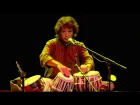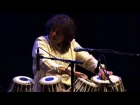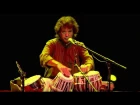Rakesh Chaurasia | en
Hariprasad Chaurasia (b. 1st July 1938) is known internationally as the greatest living master of the bansuri, the North Indian bamboo flute. Chaurasia is among the small but growing number of classicists who have made a conscious effort to reach out and expand the audience for classical music. He is probably the most accessible Hindustani musician, and has done much to popularise the bansuri and classical music.
Hariprasad Chaurasia was born into a non musical family in Allahabad. His father was a wrestler. His mother died when he was very young. Hariprasad had to learn music almost in secret, scared...
Kiev outfit Marakesh have attained national renown with their breakthrough second album "M" (2008), designed to give voice to the band's cherished themes of "sex, glam, rock, pop, and electronica... And love, too."
Their theatrical streak and evident fondness for mascara, especially in the appearance of lead singer Mark, works towards the visual expression of what Marakesh call "androgyny-rock. It's both musically sexless and emotionally overloaded." This is also a description of the band's eclectic sound.
Unprecedentedly all the songs from "M" were used in the soundtracks for multiple TV series on Channel One in Russia, while one of them...
The term Gnoua/Gnaoua/Gnawa refers firstly to a North African ethnic minority that traces its origins to West African slaves and soldiers. Gnawa communities in the Maghreb (Morocco, Algeria, and Tunisia) trace their origins to sub-Saharan Africa. Thus, like the term "African-American," Gnawa refers to a group of people whose ancestors came from diverse regions of Africa but took on a collective identity in exile. Secondly the term is used to define a religious/spiritual order consisting of aforementioned Moroccan Black Muslims, and thirdly a music style connected to this order. While the Gnawa people have retained many of the customs, rituals...






